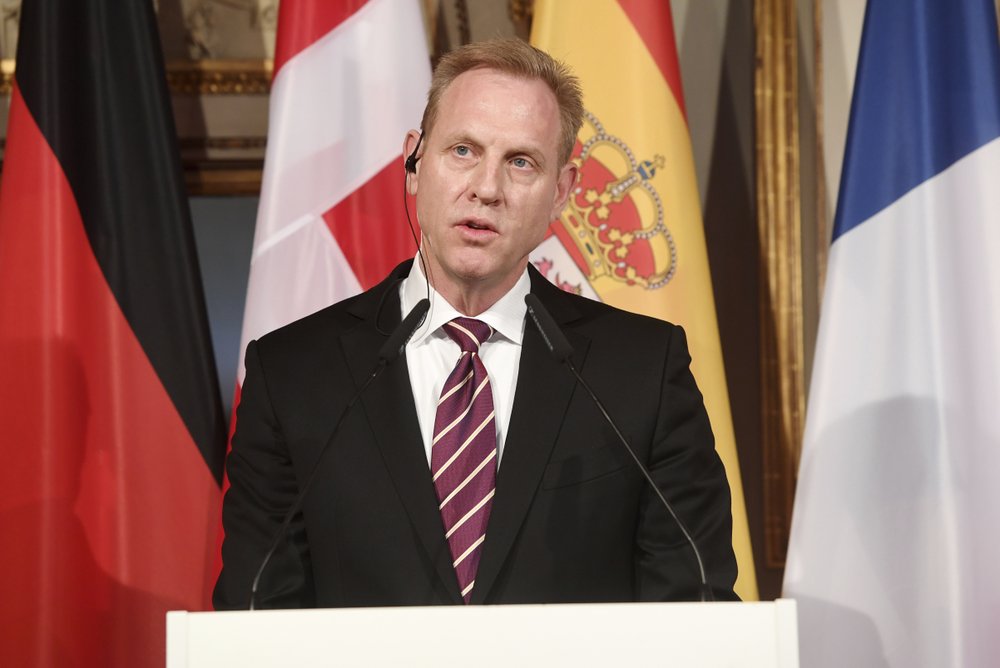The top Pentagon official said Friday he foresees a “bigger and stronger” American-led international coalition combatting the Islamic State group globally as the U.S. withdraws its troops from Syria.
Pat Shanahan, on his first trip abroad as the acting secretary of defense, made his comment after meeting in Munich with representatives of the dozen or so countries that provide troops in Iraq and Syria.
“While the time for U.S. troops on the ground in northeast Syria winds down, the United States remains committed to our coalition’s cause, the permanent defeat of ISIS, both in the Middle East and beyond,” Shanahan said in remarks to reporters.
The U.S. has about 2,000 troops in Syria and about 5,200 in Iraq.
President Donald Trump’s decision in December to pull out of Syria angered some allies, confounded U.S. military officials and prompted Jim Mattis to resign as defense secretary.
Gen. Joseph Votel, who as head of U.S. Central Command is overseeing military operations against IS in Syria and Iraq, said last week that he was not consulted before Trump made his decision.
In an interview with CNN on Friday, Votel went a step further, saying, “It would not have been my military advice at that particular time … I would not have made that suggestion, frankly.”
CNN quoted him further as saying IS “still has leaders, still has fighters, it still has facilitators, it still has resources, so our continued military pressure is necessary to continue to go after that network.”
Votel is leaving his post shortly.
Shanahan said the United States will “continue to support our local partners’ ability to stand up to the remnants of ISIS,” but he did not explain how that will be done.
A senior defense official, speaking later, said Shanahan did not discuss a timetable for the U.S. withdrawal from Syria, which other officials have said is expected to be completed in April. The coalition partners did not take issue with the U.S. withdrawal, indicating they see it as an irreversible decision, the official said, speaking on condition of anonymity to discuss the closed-door talks.
The focus of the meeting, on the topic of Syria, was how to avoid a security vacuum once U.S. troops are gone, the official said. No representatives committed to keeping troops there after the U.S. leaves, raising the possibility of clashes between Turkey — a U.S. NATO ally — and the U.S.-backed Syrian fighters known as the Syrian Democratic Forces, which suffered heavy casualties in fighting IS. The Turks view the Kurdish members of the SDF as terrorists and a treat to Turkey.
In his public remarks, Shanahan said that in Syria, IS has lost most of its leadership and resources — though he didn’t say it’s lost 100 percent of its territory.
“Together, we have eliminated the group’s hold over 99 percent of the territory it once claimed as part of its so-called caliphate,” he said. “We have ensured ISIS no longer holds the innocent people of Syria or Iraq in its murderous iron fist.”
IS militants are holed up in the last sliver of land in eastern Syria as U.S.-backed forces are closing in.
As IS retreats in Syria, some worry that substantial numbers of its fighters could migrate beyond the Middle East, to Africa, for example.
Gen. Thomas Waldhauser, commander of U.S. Africa Command, said in an interview with a small group of reporters Friday that he is not yet seeing evidence of IS movements into Africa, although he said this cannot be ruled out.
Shanahan said he and his counterparts discussed the future of their coalition, which was developed during the Barack Obama administration after U.S. forces took on IS directly in 2014 with a return of U.S. troops to Iraq as advisers and the start of a bombing campaign against IS in Syria.
“I, for one, envision an even bigger and stronger coalition going forward — one that has evolved to meet the global threat posed by ISIS’s offshoots and its murderous ideology,” he said. It needs to look beyond Syria and Iraq to face the militants’ broader threat in other parts of the world including Afghanistan and the Philippines, he said.
The senior defense official said Shanahan was not referring to increasing the number of members in the coalition — now totaling 79 — but rather adding to the quality of their contributions, including non-military offerings.
Ursula von der Leyen, the German defense minister and host of the Munich meeting, said there was agreement among participants that the fight in Iraq and Syria is not over.
“IS is changing its face at the moment, going more underground and building up networks there, including with other terror groups, partly in a global network that they are trying to expand underground,” she said.
(AP)












One Response
Why? The president has already said that the were defeated and gone?